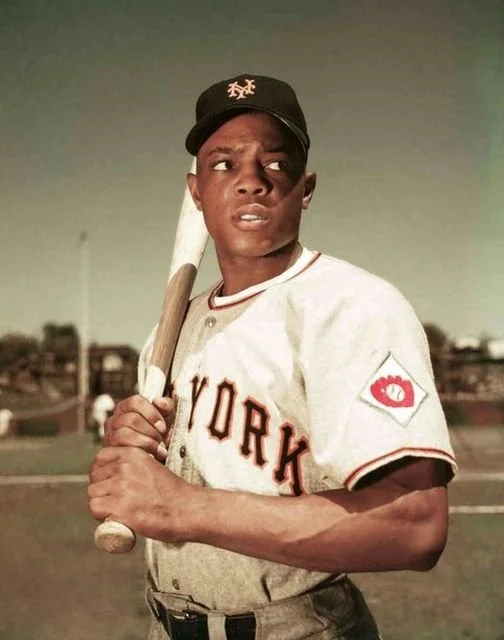Glew: Mays loved to hit at Montreal's Jarry Park
Willie Mays batted .403 in 21 games at Montreal’s Jarry Park.
June 25, 2024
By Kevin Glew
Canadian Baseball Network
As you have heard, Willie Mays, arguably the greatest all-around player in major league history, passed away last Tuesday at the age of 93.
His death was announced by the San Francisco Giants in a joint statement with his family.
“My father has passed away peacefully and among loved ones,” said Michael Mays in the statement. “I want to thank you all from the bottom of my broken heart for the unwavering love you have shown him over the years. You have been his life’s blood.”
Born in Westfield, Ala., in 1931, Mays was a World Series champion (1954), two-time National League MVP with the Giants (1954, 1965) and a 12-time Gold Glove Award winning centre fielder.
An unparalleled five-tool talent, he appeared in 24 All-Star Games, topped the National League in home runs four times and in stolen bases four times. His 3,293 hits are the 13th most in major league history, while his 660 home runs rank sixth. Mays is also fourth all-time in total bases (6,080), seventh in runs (2,068) and fifth in WAR (156.2). For his efforts, he was elected to the National Baseball Hall of Fame in his first year of eligibility in 1979.
“All of Major League Baseball is in mourning today as we are gathered at the very ballpark where a career and a legacy like no other began,” said MLB commissioner Rob Manfred in a statement. “Willie Mays took his all-around brilliance from the Birmingham Black Barons of the Negro American League to the historic Giants franchise. From coast to coast in New York and San Francisco, Willie inspired generations of players and fans as the game grew and truly earned its place as our National Pastime.”
Canadian baseball legend Fergie Jenkins (Chatham, Ont.), whom Mays batted against 60 times, was one of the first to pay tribute to the Giants legend.
“One of the most outstanding and exciting players to ever play the game,” wrote Jenkins on X. “My condolences to the Mays family. Say Hey Kid.”
Mays had 18 hits – including four home runs – in those 60 at bats against Jenkins, good for a .300 batting average. But Jenkins also struck out Mays 14 times.
Jenkins and Mays were National League teammates in the All-Star Games played in 1967, 1971 and 1972.
Loved hitting at Jarry Park
Of the 24 major league stadiums Mays played regular season games in, he registered his highest batting average at Montreal’s Jarry Park. In 21 games there, he batted .403 with 25 hits – including four home runs – and 16 RBIs.
His first game in Montreal would be a sign of things to come. Batting third and starting in centre field for the Giants on June 3, 1969, he went 3-for-4 and belted a two-run home run off Bill Stoneman in the fourth inning to lead his club to a 9-3 win.
On August 23 that same season, he had another three-hit game against the Expos at Jarry Park to propel the Giants to a 6-0 victory.
Fast forward to 1970 and Mays had two more three-hit games at Jarry Park on July 24 and July 26 to help the Giants to 8-7 and 6-2 wins respectively.
On May 9, 1972, Mays played his final game as a Giant at Jarry Park. He recorded a pinch-hit single in the top of the ninth inning in a 7-1 Giants’ loss. Two days later, he was traded to the New York Mets.
Mays also suited up for his final major league regular season game against the Expos at Jarry Park on September 9, 1973. Batting third and starting at first base for the Mets, the 42-year-old Mays went 0-for-2 with two walks in the Mets’ 3-0 win.
Recorded 3,000th hit against Expos
On July 18, 1970, Willie Mays recorded his 3,000th MLB hit off Montreal Expos right-hander Mike Wegener in the second inning of a Giants' 10-1 win at Candlestick Park. You can watch it here:
Other Canadian connections
-While reading Allen Barra’s 2013 book Mickey and Willie, I learned that at the start of the 1951 season the New York Giants’ brass were debating where they would assign Mays, their top young prospect. It came down to a decision between their two triple-A affiliates: the Minneapolis Millers (American Association) and the Ottawa Giants (International League). They chose Minneapolis, where Mays would hit a remarkable .477 in 35 games before being recalled by the Giants for good, but it’s fun to think that a young Mays came that close to playing a season in our nation’s capital.
-Mays was very aware of the significance of Jackie Robinson‘s 1946 season with the International League’s Montreal Royals. “When I was 16, in 1947, Jackie Robinson broke into the major leagues, and that was the first time most baseball fans had ever heard of him,” wrote Mays in his 1988 autobiography. “But we all knew who Jackie was. In fact, to us Black ballplayers it seemed like a bigger breakthrough when, in 1946, he signed to play with the Dodgers’ farm team in Montreal. That was organized ball. I mean, forget about the majors.”
-By my count, Mays had three Canadian teammates during his major league career: right-hander Georges Maranda (Levis, Que., 1960, Giants), left-hander Ken MacKenzie (Gore Bay, Ont., 1964, Giants) and shortstop Brian Ostrosser (Hamilton, Ont., 1973, Mets).
-Aside from Jenkins, Mays faced five other Canadian pitchers: Reggie Cleveland (Swift Current, Sask.), 3-for-6 (.500 batting average); Ken MacKenzie (Gore Bay, Ont.), 4-for-11 (two home runs, .364 batting average); Ron Piche (Verdun, Que.), 3-for-10 (.300 batting average); Claude Raymond (St. Jean, Que.), 6-for-23 (three home runs, .261 batting average) and Ron Taylor (Toronto, Ont.), 6-for-23 (three home runs, .261 batting average).
-In total, 12 of Mays’ 660 major league home runs came off Canadian pitchers.

